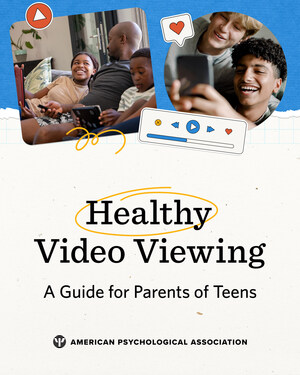Majority Of Republicans And Democrats Reassured By COVID-19 Preventative Measures But Stressed About Nationwide Uncertainty
Pandemic-related stress levels hold steady; feelings of frustration, fear and anger rising as nation struggles
WASHINGTON, July 28, 2020 /PRNewswire/ -- While the issue of how to prevent the spread of COVID-19 continues to be highly politicized, a new survey by the American Psychological Association shows a consensus among Republicans and Democrats: A majority of Republicans (65%) and Democrats (88%) report that they find preventive measures like wearing masks and physical distancing to be reassuring, and agree that it is stressful to be around others when they do not take these steps (66% Republicans, 87% Democrats).
Meanwhile, the unpredictability in our nation is causing stress across party lines as well. Most adults from both parties say the current amount of uncertainty in our nation causes them stress (67% Republicans, 76% Democrats), and similar proportions cite the political climate as a significant source of stress in their life (62% Republicans, 77% Democrats).
"As our nation continues to grapple with so much adversity, it is reassuring to see that we stand united on important issues that will help our nation heal," said Arthur C. Evans Jr., PhD, APA's chief executive officer. "The coronavirus doesn't recognize political boundaries, so our country will be best served if we come together in a bipartisan effort in this historic fight to overcome the pandemic — a common enemy."
Stress in AmericaTM 2020: Stress in the Time of COVID-19, Volume Three, was conducted by The Harris Poll from June 23 to July 6; the online survey included 3,010 adults age 18+ who reside in the United States. This is APA's third "pulse check" of the nation's stress and mental health to gauge the impact of the pandemic and civil unrest. The previous surveys were released in May and June.
Many individuals from both parties agree that people are acting as if the coronavirus pandemic is over (75% Republicans, 86% Democrats). Although two-thirds of Democrats (66%) and Republicans (71%) say they are confident they can protect themselves from coronavirus once the U.S. reopens, more than half of U.S. adults (58%) wish they had more information about how to keep themselves and/or their family healthy as the U.S. reopens.
While average reported stress levels related to the coronavirus pandemic have remained generally consistent over the past three months (5.7 in June–July, 5.6 in May–June, 5.9 in April–May), the proportion of Americans reporting certain negative feelings as a result of the coronavirus pandemic has increased significantly. Specifically, Americans are more likely to report feeling frustrated (40% June–July, 31% May–June, 31% April–May), scared (24% June–July, 16% May–June, 19% April–May), and angry (18% June–July, 13% May–June, 12% April–May) than they were three months ago.
"As the consistent stress endured since the start of the pandemic evolves into more intense negative emotions, we are reminded that the mental health of our nation continues to suffer severe consequences as a result of the trauma of the times," said Evans. "The path toward recovery will take time and needs to be addressed on a system-wide level by increasing access to mental health services and supports and on an individual basis through self-care."
As infection rates continue to increase in a majority of states, around 2 in 3 Americans (66%) say getting COVID-19 is a significant source of stress in their lives, which is significantly more than said the same in May–June (61%). Furthermore, the regional representation of this stressor seems to mirror the spread of the virus, with the proportion of adults citing this stressor generally rising across the Midwest, South, and West (Midwest: 63% June–July, 57% May–June, 56% April–May; South: 68% June–July, 66% May–June, 65% April–May; West: 68% June–July, 56% May–June, 64% April–May), while declining in the former epicenter in the Northeast (61% June–July, 61% May–June, 70% April–May).
The survey also provided updates on the state of stress related to aspects of racial injustice. Sixty percent of Americans say police violence toward minorities is a significant source of stress. This number has nearly doubled since 2016 when 36% said the same in that year's annual Stress in AmericaTM Survey1 when APA first started tracking this data point. Moreover, nearly two-thirds of Americans (64%) report the government response to the protests following the death of George Floyd is a significant source of stress. On a positive note, more than 3 in 5 U.S. adults (63%) agree the current movement against systemic racism and police brutality is going to lead to meaningful change in America.
To read Stress in AmericaTM 2020: Stress in the Time of COVID-19, Volume Three in full or to download graphics, visit the Stress in America Press Room webpage. APA also offers resources for the public on mental health during COVID-19, including resources specially for parents and on racial equity and health disparities.
Methodology
Wave 3 of the COVID Tracker was conducted online within the United States by The Harris Poll on behalf of the American Psychological Association between June 23 and July 6, 2020, among 3,010 adults age 18+ who reside in the U.S. Interviews were conducted in English and Spanish. Data were weighted to reflect their proportions in the population based on the 2019 Current Population Survey by the U.S. Census Bureau. Weighting variables included age by gender, race/ethnicity, education, region, household income and time spent online. Hispanic adults also were weighted for acculturation, taking into account respondents' household language as well as their ability to read and speak English and Spanish. Country of origin (U.S./non-U.S.) also was included for Hispanic and Asian subgroups. Weighting variables for Gen Z adults (ages 18 to 23) included education, age by gender, race/ethnicity, region, household income and size of household. Propensity score weighting was used to adjust for respondents' propensity to be online.
The American Psychological Association, in Washington, D.C., is the largest scientific and professional organization representing psychology in the United States. APA's membership includes nearly 121,000 researchers, educators, clinicians, consultants and students. Through its divisions in 54 subfields of psychology and affiliations with 60 state, territorial and Canadian provincial associations, APA works to advance the creation, communication and application of psychological knowledge to benefit society and improve lives.
1 The 2016 Stress in America™ survey was conducted online within the United States by The Harris Poll on behalf of the American Psychological Association between Aug. 3 and Sept. 1, 2016, among 3,511 adults age 18+ who reside in the U.S. This online survey is not based on a probability sample and therefore no estimate of theoretical sampling error can be calculated.
SOURCE American Psychological Association

WANT YOUR COMPANY'S NEWS FEATURED ON PRNEWSWIRE.COM?
Newsrooms &
Influencers
Digital Media
Outlets
Journalists
Opted In






Share this article